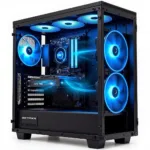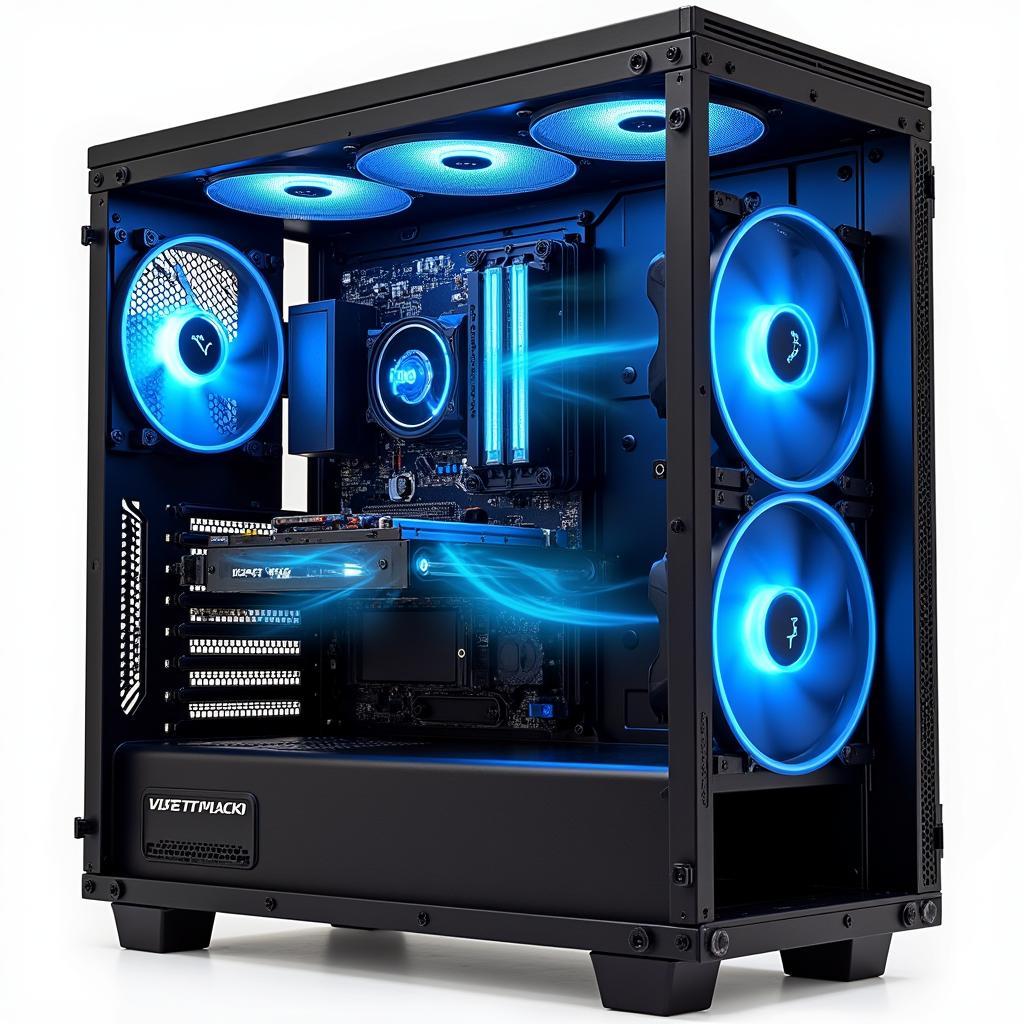Case Fan Noise is an unfortunate side effect of having a powerful and efficient PC. As components generate heat, fans work tirelessly to keep temperatures in check, but this often comes at the cost of unwanted noise. This article will delve into the common causes of case fan noise, explore effective solutions, and help you achieve a quieter computing experience.
What Causes Case Fan Noise?
Before jumping into solutions, it’s crucial to understand the root causes of the problem. Several factors contribute to case fan noise:
- Fan Speed: Higher fan speeds generate more airflow, which effectively dissipates heat but also produces more noise.
- Fan Bearing Type: Different bearing types have varying noise levels. Sleeve bearings are generally the noisiest, followed by ball bearings, while fluid dynamic bearings and magnetic levitation bearings offer quieter operation.
- Fan Size and Design: Larger fans can move the same amount of air at lower speeds compared to smaller fans, resulting in less noise. Additionally, fan blade design plays a role in noise generation.
- Airflow Obstruction: If airflow is restricted within your case due to poorly placed cables, dust buildup, or an insufficient number of intake and exhaust fans, your fans may need to work harder and produce more noise to compensate.
- Resonance and Vibration: Vibrations from fans can resonate through the case, amplifying the noise. Loose screws or components can further exacerbate this issue.
Effective Solutions for a Quieter PC
Fortunately, several strategies can help reduce case fan noise and create a more peaceful computing environment:
1. Clean Your PC Regularly
Dust acts as an insulator, trapping heat and forcing your fans to work harder. Regularly cleaning your PC, including fans, heatsinks, and filters, is crucial for optimal cooling and noise reduction.
2. Optimize Fan Curves
Adjusting fan curves in your BIOS or using fan control software allows you to fine-tune fan speeds based on system temperatures. By setting a less aggressive fan curve, you can significantly reduce noise without sacrificing optimal cooling.
3. Choose Quieter Fans
Investing in high-quality fans with quieter bearing types and optimized blade designs can make a noticeable difference. Look for fans with fluid dynamic bearings or magnetic levitation bearings for superior noise reduction. Consider replacing smaller, louder fans with larger, quieter models that move more air at lower speeds.
4. Improve Case Airflow
Ensure your case has adequate airflow by strategically placing intake and exhaust fans. Aim for a balanced airflow configuration where cool air is drawn in and hot air is expelled efficiently. This balanced approach prevents pressure buildup and reduces strain on your fans.
5. Use Anti-Vibration Mounts and Dampeners
Anti-vibration fan mounts and rubber grommets can absorb vibrations and prevent them from transferring to the case, minimizing resonance and noise. Additionally, consider using sound-dampening materials within your case to further absorb noise.
6. Consider Liquid Cooling
For enthusiasts seeking even quieter operation, liquid cooling solutions offer superior heat dissipation with minimal noise. While more expensive and complex to install, liquid cooling provides significant noise reduction, especially for high-performance systems.
Case Fan Efficiency Review: A Worthwhile Consideration
Choosing efficient case fans is crucial for balancing cooling performance with noise levels. A case fan efficiency review can provide valuable insights into different fan models and help you select options that meet your specific needs.
Conclusion
Case fan noise can be a nuisance, but by understanding the causes and implementing the solutions outlined above, you can create a quieter and more enjoyable computing experience. Remember to prioritize regular cleaning, optimize fan curves, and invest in high-quality components. With a little effort, you can strike a balance between cooling performance and noise levels, allowing you to work and play in peace.
FAQs
Q: Can I add more fans to my case to reduce noise?
A: Yes, adding more fans can improve airflow and allow all fans to operate at lower speeds, resulting in less noise.
Q: Do all cases come with pre-installed fans?
A: Not all cases include pre-installed fans. Check the case specifications before purchasing to determine the included fan configuration.
Q: Is it worth investing in a fan controller?
A: Fan controllers provide granular control over fan speeds, allowing for greater customization and potentially quieter operation. They are a worthwhile investment for users who prioritize noise reduction and want more precise control over their cooling system.
Q: How often should I clean my PC to minimize fan noise?
A: It’s generally recommended to clean your PC every 3-6 months. However, if you live in a dusty environment or use your PC extensively, more frequent cleaning may be necessary.
For more information on specific fan models and troubleshooting tips, you can explore resources like the b450m pro4 fan guide or delve into the specifics of popular options like the fan case 1stplayer 12cm a1-30.
Need help with your 75mm fan? Check out our 75 fan resources for solutions and advice.
If you’re facing issues with your attic fan, consider seeking professional assistance. You can find reliable attic fan repair portland services to address your needs.
Contact us for support at:
Phone Number: 0903426737
Email: [email protected]
Address:
Tổ 9, Khu 6, Phường Giếng Đáy,
Thành Phố Hạ Long, Giếng Đáy, Hạ Long,
Quảng Ninh, Việt Nam.
We have a dedicated customer support team available 24/7 to assist you.

